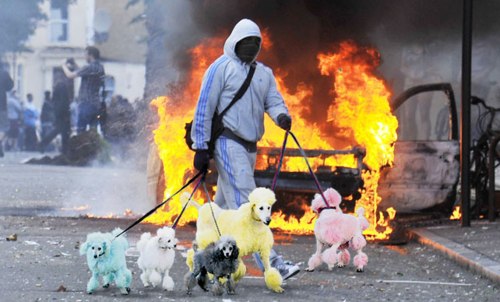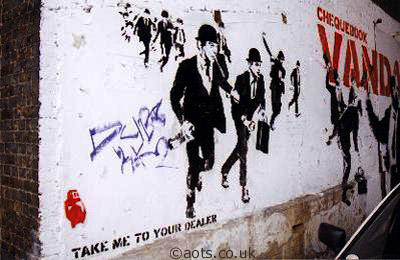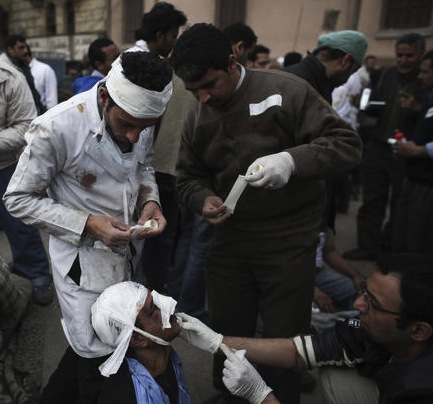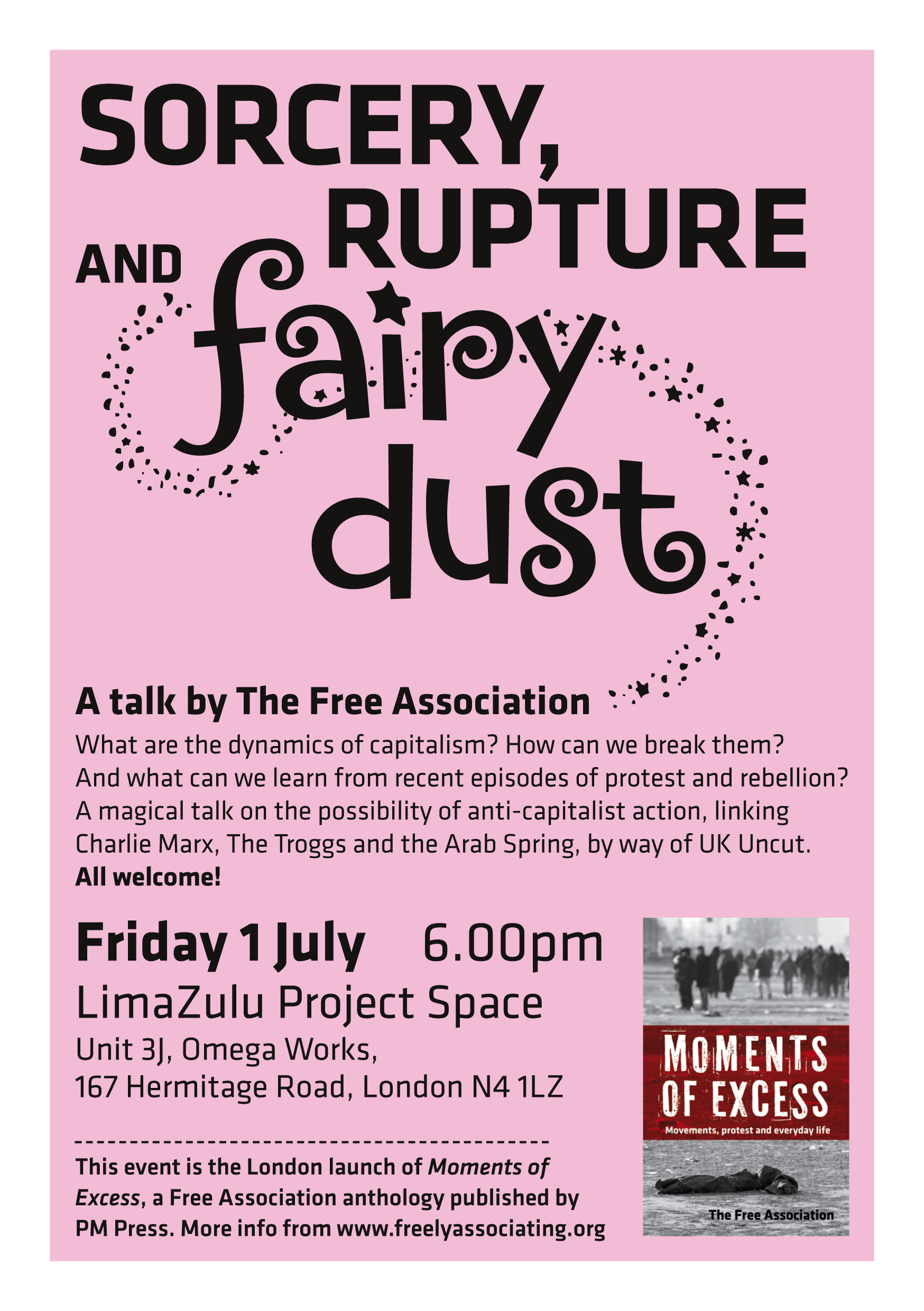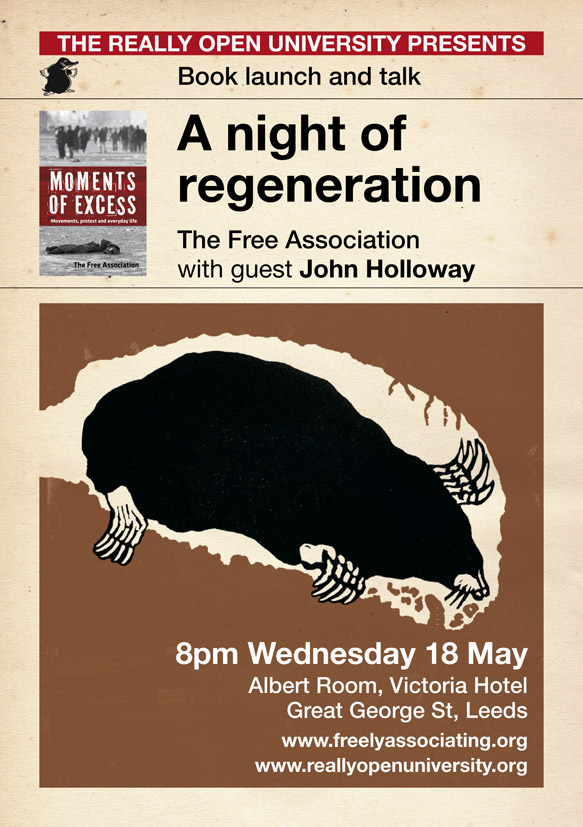As part of a debate elsewhere, somebody asks whether the “August days of 2011 [i.e. last weekend’s rioting and looting] can be considered in terms of moments of excess”. It’s a good question.
For us a moment of excess is an intense collective experience, a moment in which we feel — viscerally — our own collective power, a moment in which we glimpse other worlds outside and beyond capitalist social relations. So in this sense there’s no doubt the nights of rioting and looting were moments of excess for many of the participants. They experienced that collective power, they took over the streets, they cocked a snoop to the “Feds” (“Annoyed that the rioters call the police ‘feds’,” tweets Ben Liddell. “What happened to proper British nicknames like old bill, pigs and filth?”), and they took according to their needs (one half of Marx’s understanding of communism).
But moments of excess aren’t “pure”; they don’t stand “outside” of capitalism. The glimpse of other worlds we get in a moment of excess is from the standpoint of where we are now, i.e. within a fucked-up, capitalist world. And there’s no doubt a lot of fucked-up stuff took place over the four nights of rioting. From relatively minor incidents, such as the robbing of the young Malaysian by people pretending to help him or the pulling of cyclists from their bicycles, to really major instances of fucked-up, anti-social behaviour — the cases of arson and the killing of the three young men in Birmingham. (More pervasively, one outcome maybe more gentrification and more concentration of capital in the retail sector.)
We’re not interested in drawing up criteria which determine whether events qualify as moments of excess, or which can categorise their content as “progressive” or “revolutionary” or “anti-social” or “reactionary” excess. There’s a danger here of simplifying the notion of moments of excess so that they become a glimpse of some pure liberated zone, a taste of milk and honey. The streets of Tottenham, Hackney, etc. were certainly not pure liberated zones.
In many ways, for us, the more interesting question is not: what are moments of excess and how can we get into them? Rather it is: how can we get out of moments of excess? I.e. what happens afterwards, and what is the relationship between a moment of excess and “everyday life”?
And these questions are certainly the ones we need to be addressing right now.
We’re in the midst of a furious, knee-jerk reaction on the part of the British state. Cameron and the Tories are fuming, and magistrates seem to have responded with gusto to the instruction to “disregard the guidelines” and are delivering their “disproportionate” sentences. We need to be able to counter that. In large part, this will depend on what happens from the bottom up, that is, in the neighbourhoods at the heart of the unrest. Will people hunker down and hope that theirs isn’t the next door to be kicked in? Or will they organise in some way, countering the state’s age-old strategy of individualisation? (Out of 1990’s poll tax riot, for example, emerged the Trafalgar Square Defendants’ Campaign, which became a model for political activists over the subsequent two decades.)
Also interesting and important are the discursive cracks which have opened up within the Establishment — in spite of, or maybe because of, the state’s totalising clampdown. I’m not thinking so much of the Liberal Democrats’ “bonkers, bonkers, bonkers” comments — they clearly need to put some clear blue water between themselves and the Conservatives and Clegg is probably a little nervous that his own arson conviction might be brought up again.
More I’m interested in the journalists who are starting to join the dots. In BBC Radio Nottingham’s interview with Clegg, for example, the presenter, having rattled the deputy PM, says that, yes, he does feel empathy for the rioters. And here is Daily Telegraph columnist Mary Riddell:
It is no coincidence that the worst violence London has seen in many decades takes place against the backdrop of a global economy poised for freefall. The causes of recession set out by J K Galbraith in his book, The Great Crash 1929, were as follows: bad income distribution, a business sector engaged in “corporate larceny”, a weak banking structure and an import/export imbalance.
All those factors are again in play. In the bubble of the 1920s, the top 5 per cent of earners creamed off one-third of personal income. Today, Britain is less equal, in wages, wealth and life chances, than at any time since then. Last year alone, the combined fortunes of the 1,000 richest people in Britain rose by 30 per cent to £333.5 billion.
She goes on to propose social democracy as the only solution:
The failure of the markets goes hand in hand with human blight. Meanwhile, the view is gaining ground that social democracy, with its safety nets, its costly education and health care for all, is unsustainable in the bleak times ahead. The reality is that it is the only solution.
Here’s another Telegraph columnist, suggesting that “the criminality in our streets cannot be dissociated from the moral disintegration in the highest ranks of modern British society”:
Our politicians – standing sanctimoniously on their hind legs in the Commons yesterday – are just as bad. They have shown themselves prepared to ignore common decency and, in some cases, to break the law. David Cameron is happy to have some of the worst offenders in his Cabinet. Take the example of Francis Maude, who is charged with tackling public sector waste – which trade unions say is a euphemism for waging war on low?paid workers. Yet Mr Maude made tens of thousands of pounds by breaching the spirit, though not the law, surrounding MPs’ allowances.
A great deal has been made over the past few days of the greed of the rioters for consumer goods, not least by Rotherham MP Denis MacShane who accurately remarked, “What the looters wanted was for a few minutes to enter the world of Sloane Street consumption.” This from a man who notoriously claimed £5,900 for eight laptops. Of course, as an MP he obtained these laptops legally through his expenses.
Yesterday, the veteran Labour MP Gerald Kaufman asked the Prime Minister to consider how these rioters can be “reclaimed” by society. Yes, this is indeed the same Gerald Kaufman who submitted a claim for three months’ expenses totalling £14,301.60, which included £8,865 for a Bang & Olufsen television.
Or take the Salford MP Hazel Blears, who has been loudly calling for draconian action against the looters. I find it very hard to make any kind of ethical distinction between Blears’s expense cheating and tax avoidance, and the straight robbery carried out by the looters.
From the Daily Telegraph this is incredible stuff!
Perhaps, slightly less unlikely, here is Channel 4 newsreader/journalist Jon Snow, pointing out that there is “one law for the rich and another for the poor”:
There is a sense in Britain too of a widening gap in both wealth and law – that there is a that there is one law for the elite and one for the poor. Take the MPs’ and Peers’ expenses scandal. A tiny handful of the expenses abusers have gone to jail. The vast majority have been allowed to pay stuff back or retreat to the political undergrowth. How many of the looters will be allowed to bring their plasma screens and running shoes back in return for their freedom? And yet it is the very unpunished abuse of the state by its elected and unelected elite which many argue is part of the landscape that the recent riots played out across.
We are told over two and a half thousand rioters and looters have been arrested. Hundreds have been charged, some have already been punished – many cases are still in train.
Many have pointed to the reality that an even smaller handful of bankers have faced the law even than those politicians who have been prosecuted. No British banker is in jail for what happened in 2008. And as financial upheaval cascades before us all over again, almost no serious measures have been taken to stop the same people from doing it to the people all over again.
To keep replicating that meme, I think these cracks, these discursive spaces, have opened up because neoliberalism has become zombie-like, it no longer makes sense. So we need new stories to help us make sense of our lives: it’s only if we can get a (collective) grip on what’s going on in the world, that we’ll be able to (collectively) change the world. So, it’s important that we keep the cracks open.

